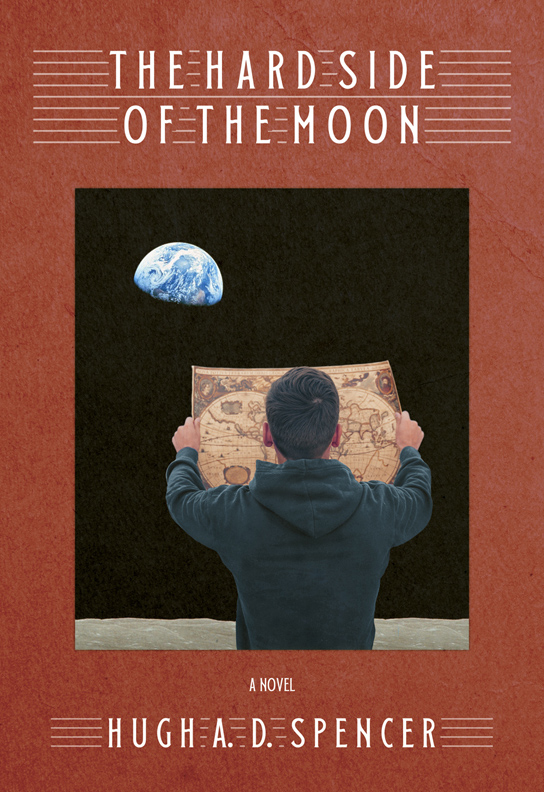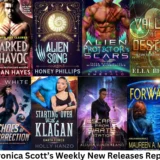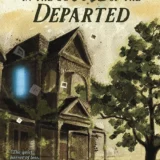
OBIR: Occasional Biased and Ignorant Reviews reflecting this reader’s opinion.

The price of Memory and More Stories – by Sally McBride
Publisher: Brain Lag Publishing, Milton, Ontario, Canada, October 2024.
Cover Art by Alex Shuper
Note: All stories in this collection are by Sally McBride.
The Doll Ladies
Premise:
Erika, a woman incapable of bearing children, works with surrogate-mother gorillas carrying human fetuses.
Review:
Zamuka is Erika’s favourite. Zamuka’s job is to give birth to genetically modified female gorillas capable of carrying humans. Since the rise of a certain virus doomed all humans of natural birth to fatal mutations, only ape surrogate-mothers can maintain the human race. Alas, Zamuka is an elderly gorilla and will probably soon be euthanized. Erika doesn’t want that to happen.
This is science fiction at its most fascinating. Numerous social, psychological, political and economic implications are explored in depth, with the reader rooting for Zamuka all the way. Always in the background, our ruthless urge to survive as a species no matter what the cost. This is why empathy, compassion and mercy are in such short supply.
The terrifying thing is this tale is science fiction rather than fantasy, in that, given medical technology advances, utilizing ape surrogate mothers may well prove possible. What then the role of human sentiment in motherhood? And how do the gorillas feel about it? A deeply intriguing story.
Her Eyes as Bright as Unsheath’d Swords
Premise:
The Emir of Izban struggles to pursue a moderate course between his wildly progress-minded wife/queen Nuzbayah and the incorrigibly conservative religious leader Taruman.
Review:
The Emir often wishes he could retreat into the romantic tradition of genies and magical lamps and flying carpets he so loved as a boy. Having to make do with armoured limousines is a poor substitute. But at least his wife is in the habit of bringing him beautiful presents every time she returns from her European shopping trips. Presents reflecting his nostalgic dreams.
A short fantasy story with vivid description evoking both past and present. It seems that Western civilization isn’t the only society which longs for the never-existent “good old days.”
Pick My Bones with Whispers
Premise:
A young student is doing biological research on an alien planet. None of the local aliens are intelligent enough to be a threat, until one specie’s reproductive instincts kick in and renders it incredibly destructive.
Review:
This alone would make for a good story in the golden era of science fiction (whichever decade you choose to assume that fits). This being the modern era, the premise of this contemporary tale set in the far future is mere setup to a complex family relationship story to do with humans interacting with artificial intelligence in a symbiotic manner. Turns out making it past puberty is just the first step in fully mastering maturity. Is this what our inevitable evolutionary fate is destined to be? I’m almost convinced it would be worthwhile, but not quite. I choose to remain paranoid about AI.
Nevertheless an interesting story whose characters and motivation are credible in a context which may be genuinely prophetic.
After the First Death
Premise:
Not every Vampire’s victim deserves to be a victim.
Review:
Essentially this story involves bloodlust so powerful it is a source of emotions vampires have learned to live without ever since their induction into the supernatural. Consequently, they are unable to cope. We mortals think we have it bad when we age and run into more and more reminders of our mortality. Far worse to be slapped in the face with the full implications of undead immortality. Emotions not always good for the soul. No wonder every vampire secretly feels sorry for itself. Emotionally speaking, a powerful story.
The Price of Memory
Premise:
Aliens who’ve devolved from ancient glory make pretty good servants for human colonists, till the humans begin fighting each other and it occurs to the natives maybe they should get involved.
Review:
In that Maggie pursues forbidden goals aided by her “bio” she named “Kat,” her bio, like Maggie herself, being a curious combination of individual and AI, I couldn’t help but be reminded of one of my favourite books from my youth, “Catseye” by Andre Norton. A similar sort of symbiotic relationship at play. This observation is meant as a compliment to both authors and constitutes an argument that the story is well worth reading.
The gist of the setup is the discovery of an alien world where the native civilization has collapsed and the degenerate remnants of the original creators are so eager to regain something of their past glory that they willingly become labour slaves of the human colonists, to the point of entirely replacing machine technology with nonhuman labour. The situation is more complicated than that, for instance most servant bios being augmented bios grown in vats by feral bios living in the wild, but a feudal society with a high standard of living for humans is the essence of the situation.
Most humans live in colonies built atop the ruins of the indigenous cities. Maggie’s “job” is to explore the lowest layer of the ruins for hidden treasures. What she finds renders the civil war raging above anti-climactic compared to what’s coming next. This plunges her into the fears and concerns of literally every sentient being on the planet. Fair to say this is not what she wants to put on her resume. She becomes much sought after in a manner not necessarily to her advantage. She needs to prove that her remaining alive is to everyone’s advantage. Quite the conundrum.
Andre Norton had the knack of making bio-technology and even magic as credible as machine technology. In this story Sally McBride exhibits the same level of skill. Nothing distracts you from the premise. The speculative aspects are blended seamlessly with the ambience of the society and plot. I thoroughly enjoyed reading this.
Walk to Bryten
Premise:
More often than not a painting is more than a painting.
Review:
In many a classic renaissance painting the patron, with or without his family, is depicted seated in a room in his house, surrounded by precisely detailed furnishings, often including a painting or a window through which a totally different scene can be glimpsed. Many critics argue the scene within a scene is usually key to understanding what the artist is attempting to convey about the subject of the painting, sometimes more than what the patron intended.
In this story the woman depicted in the painting, Alema, is drawn to the window in her room as much as her viewer is drawn to the portrait of Alema. The more fascinated and obsessed the outlier outside the frame of the art piece becomes, so too Alema as she contemplates her window. Curiously, given the presentation of Alema as a figure in a static painting, she is more animated than her viewer. As if the power of imagination is enough to turn a layer of paint on canvas into a glimpse of a living alternative universe, every painting potentially a window on an alternative reality.
This is not as farfetched as it sounds. In the Vancouver art gallery years ago, I stood mesmerized by a photo of the artist Edvard Munch (most famous for his “Scream”) standing in the open doorway to his slum flat studio. The gallery had blown up the photo to life-size and every detail of his pathetic furnishings, for example the legs of his cot in water-filled pots to keep the bed bugs from climbing up, stood out vividly. It was as if I had gone back in time to serve an eviction notice to Munch (who had a very sour expression on his face). Munch’s eyes were level with my own. I felt as if I were confronting him face-to-face. Other people in the gallery barely gave the photo a passing glance. I stared at it for about half an hour.
Point is, because of my experience with Munch I can readily identify with the narrator of the story losing herself in the picture. Besides, I normally attempt to “jump into” any painting or movie or story I’m looking at. This is why I find anything which knocks me out of “the story” so jarring. I want to be a fly on the wall in everything I see or read.
As a story, this tale is in the nature of a surreal vignette depicting a dream, one which is so powerful in its imagery it lingers in the memory.
——
CONFESSION:
This is the first review I’ve attempted since my last one posted October 28. The culprit is the dread slog I’ve been ploughing through to send out responses to all the poems and short stories submitted to me for the issues of Polar Borealis and Polar Starlight I plan to publish in the coming year. I received 166 poems and 118 short stories. I’ve responded to the poetry submissions but still have about 30 authors I need to contact. Three or four day’s work for sure.
I decided I just had to get back to writing reviews. Believe it or not, it took me the entire weekend just to review the first 6 stories in this collection. My thinking and writing stamina not what it used to be. Best I could do.
So, apologies to Sally McBride and Brain Lag Publishing. I gave it my best shot within my current energy and time constraints. I do believe I managed to explain why I enjoyed reading all 6 stories with, of course, the implication that anyone reading this book will find it a rewarding experience.
The titles of the remaining stories hint at the further delights this collection offers.
The Bones at the Bottom of the Sea
Little Feather
Dance on a Forgotten Shore – Co-written with Alan Dean Foster
The Singing Box
My Mother’s Garden
Doing Drugs
Thank Yew Very Much
Szabra’s Souls
Intersection
CONCLUSION:
Sally McBride is a master at concocting characters and writing styles best suited to the innovative and original premise of each story her imagination comes up with. This is what makes her fiction so much fun. She is a thoroughly professional writer who knows her craft. You can relax when you open her book. I guarantee you’re in for an immersive ride as smoothly inevitable as a flash flood. Good writing. Good fiction. Good reading.
Available here: < The Price of Memory >









